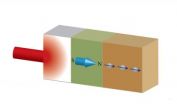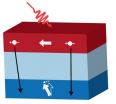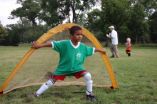Men's hot flashes: Hypnotic relaxation may ease the discomfort men don't talk about
2014-07-10
(Press-News.org) WACO, Texas (July 10, 2014) — Men who experience hot flashes are unlikely to talk much about it, but they may find relief from their silent suffering if they are willing to try an unusual treatment, according to findings from a Baylor University case study.
After seven weeks of hypnotic relaxation therapy, a 69-year-old man who had uncontrolled hot flashes following prostate cancer surgery showed a drastic decrease not only in hot flashes but also an impressive improvement in sleep quality, according to the study.
The Baylor study — funded by the National Institutes of Health — is published in the International Journal of Clinical and Experimental Hypnosis.
"Men are more reluctant to report hot flashes, and it's not as prevalent. There are fewer ways to deal with it," said study author Gary Elkins, Ph.D., director of Baylor's Mind-Body Medicine Research Laboratory and a professor of psychology and neuroscience in Baylor's College of Arts & Sciences. "If a guy has hot flashes, you can't say, 'Well, why don't we put you on estrogen?' But it's a pressing problem."
Men's hot flashes are, of course, not related to estrogen, the primary female sex hormone, Elkins said. They occur in men with a history of prostate cancer — the second most common malignancy in men — or another disorder causing a testosterone deficiency.
Up to 80 percent of prostate survivors experience hot flashes, and about 50 percent of those experience them as severe and needing treatment. What's more, hot flashes due to prostate cancer tend to be more frequent, more severe and more prolonged than those women experience. Elkins has done extensive research showing that hypnotic relaxation therapy greatly benefits postmenopausal women and breast cancer survivors who suffer from hot flashes.
Current treatments for men are varied, ranging from hormone therapy to acupuncture, but outcomes have been mixed — and safety of some treatments remains in question, Elkins said.
The man in the Baylor study — referred to as "Mr. W" — was a married African African-American who suffered nightly hot flashes in 1999 because of androgen deficiency. He found some relief through testosterone injections — but in 2010, he was diagnosed with prostate cancer and forced to discontinue hormone therapy. Shortly after his prostate was surgically removed, he again began suffering hot flashes.
He underwent seven weeks of drug-free, hypnotic relaxation therapy involving clinically trained therapists and introducing self-hypnosis, with results measured in self-reporting and physiological testing done through wearing skin monitors with electrodes, Elkins said. By treatment's end, he experienced a 94 percent reduction in hot flashes. His sleep quality improved by 87 percent, measured by a standardized test, and although the sleep quality had dropped at a 12-week follow-up, it remained in the "good quality of sleep" range, according to the study.
In an audio recorded interview with Elkins after several weeks of the therapy, "Mr. W" said he was at first skeptical and apprehensive, but "my wife said, 'Try it. What have you got to lose?' . . . It has helped tremendously. One time, I got so relaxed I thought I could hear myself snoring, but I could hear the young lady that was taking me through the steps of hypnosis of where I'd go to be most comfortable."
As part of the process, he kept a diary, initially chronicling up to 160 flashes a week — a "tremendous heat" and profuse sweating. But over the course of the treatment, those dropped to about 15 a week, he said in the interview.
Besides being guided through steps by a therapist, he took part through self-hypnosis, visualizing fishing at his favorite Texas lake. He donned imaginary rubber boots, waded into the water and enjoyed a cool breeze as he cast a line and fish began to nibble.
The therapy "eliminated the flashes, calmed me down, cooled my body off," he said. "During one session, I needed a blanket . . . The self-hypnosis was empowering."
The new research follows previous published studies by Elkins that found a marked decrease in hot flashes among postmenopausal women and also among breast cancer survivors who have undergone hypnotic relaxation therapy. It reduced hot flashes by as much as 80 percent, and research findings by clinically trained therapists show it also improved participants' quality of life and lessened anxiety and depression. (Quality of life included such issues as work, sexuality, social and leisure activities, mood and concentration.)
"And that's all without the increased risk of breast cancer or heart disease associated with hormone treatments such as estrogen or progestin," Elkins said.
The weekly sessions of hypnosis of 187 women over a five-week period involved hypnosis by clinically trained therapists. The women also practiced self-hypnosis using audio recordings to visualize a snowy path or cool mountain creek. During the treatments, the women wore skin monitors with electrodes and kept diaries of when they had hot flashes, how often, how severe they were, and what might have triggered flashes, such as stress, spicy foods or being in a hot room.
Women also were encouraged to individualize their therapy. An example: One woman's imagery was walking to a lake from her porch to sit on lawn chairs with her family at sunset.
Previous research has shown that people vary when it comes to being "hypnotizable" — responsive to hypnosis — but the consensus is that most people are at least moderately so.
Besides having few or no side effects, hypnotic relaxation therapy is cost-saving and allows patients to be involved in their own healing.
"There's no 'One size fits all,' '' Elkins said, noting that for women, hormone replacement therapy improves bone health and lowers the risk of some types of colon cancer. "But hypnotic relaxation therapy has been shown to be the most effective drug-free option – as well as having few or no side effects."
INFORMATION:
Co-researchers were Cassie Kendrick and Lauren Koep Crenshaw, former graduate students in Baylor's Mind-Body Medicine Research Laboratory. Kendrick has a private practice in clinical psychology in Waco; Crenshaw is a staff psychologist with the South Texas Veterans Health Care System in San Antonio.
Gary Elkins is the author of Relief from Hot Flashes: The Natural, Drug-Free Program to Reduce Hot Flashes, Improve Sleep, and Ease Stress (Demos Health Publishing). His research has been published in Menopause: The Journal of The North American Menopause Society, and he is president-elect for the Society for Psychological Hypnosis, a division of the American Psychological Association.
ELSE PRESS RELEASES FROM THIS DATE:
New research identifies risk factors for little league shoulder
2014-07-10
SEATTLE, WA – As cases of Little League Shoulder (LLS) occur more frequently, the need for additional information about the causes and outcomes of the condition has become clear. Researchers presenting at the American Orthopaedic Society for Sports Medicine's (AOSSM) Annual Meeting today shared new data identifying associated risk factors, common treatment options and return to play.
"Our study examined 95 patients ranging from 8-17 years old diagnosed with Little League Shoulder," commented Benton E. Heyworth, MD, corresponding author from Children's Hospital Boston, ...
Entering MLB early may increase elbow surgery risk
2014-07-10
SEATTLE, WA – The common elbow surgery made famous by Major League Baseball (MLB) pitcher, Tommy John, definitely does its job to return pitchers to the mound, but risks for having the surgery may be able to be recognized earlier in a player's career, say researchers presenting their work at the American Orthopaedic Society for Sports Medicine's (AOSSM) Annual Meeting today. The study was the largest cohort of MLB pitchers, to date, that have undergone UCL reconstruction.
"Our results suggest that UCL reconstructive surgery does a tremendous job in allowing players to ...
Young athletes should consider the benefits of ACL surgery
2014-07-10
SEATTLE, WA – Young patients who wait for ACL surgery may be at increased risk for secondary knee injuries, according to research presented today at the American Orthopaedic Society for Sports Medicine's (AOSSM) Annual Meeting. The study adds to existing research noting the risk of secondary meniscal and chondral injuries in pediatric patients.
"In reviewing records of young patients who received ACL reconstructions, our data showed higher rates and severity of secondary meniscus injuries when surgery is delayed," noted lead author Allen F. Anderson, MD, from the Tennessee ...
Intercollegiate contact athletes with shoulder instability return to in-season sports
2014-07-10
SEATTLE, WA – College athletes experiencing in-season shoulder instability regularly return to play within one week of injury, but developed recurrent instability in 63% of cases, according to research presented today at the American Orthopaedic Society for Sports Medicine's (AOSSM) Annual Meeting. This latest information may help guide team physicians in providing the most optimal treatment plans for injured players.
"We examined 45 athletes who suffered an anterior shoulder instability event, and found that 33 (73%) returned to play for at least part of the season after ...
Stabilizing shoulder surgery helps NFL players return to the game
2014-07-10
SEATTLE, WA – Shoulder instability is a common injury in football players but the rate of return to play has not been regularly determined following surgery. A new study, discussed at the American Orthopaedic Society for Sports Medicine's (AOSSM) Annual Meeting today details that return rates for NFL players is approximately 90 percent no matter what the stabilization procedure (open vs. arthroscopic).
"Our study highlighted the success rate of return to play following shoulder stabilization surgery. Age, number of games before surgery, and career length were not statistically ...
University of Illinois study advances limits for ultrafast nano-devices
2014-07-10
A recent study by researchers at the University of Illinois at Urbana-Champaign provides new insights on the physical mechanisms governing the interplay of spin and heat at the nanoscale, and addresses the fundamental limits of ultrafast spintronic devices for data storage and information processing.
"Electrons carry a charge as well as spin-angular momentum. In a typical charge current, electrons' spin-angular-momentum is random so there is no spin current," explained David Cahill, a professor of materials science and engineering at Illinois. "However when electrons ...
Speeding up data storage by a thousand times with 'spin current'
2014-07-10
A hard drive stores bits in the form of tiny magnetic domains. The directions of the magnetic north and south poles of these domains, which are referred to as the magnetization, determine whether they are a 0 or a 1. Data is stored by changing the direction of the magnetization of the associated bits. At present this is done using a write head to create a local magnetic field, which makes a bit change direction.
Limit reached
The stronger the local magnetic field, the faster the switch takes place. But this is subject to a limit which has now almost been reached. "The ...
Being a good sport ranks as the top 'fun' factor in study of youth sports
2014-07-10
WASHINGTON, DC (July 10, 2014) — If you think winning is one of the key determinants that makes organized sports fun for kids think again: Winning along with other mental bonuses ranked near the bottom of 81 determinants of fun, each of which falls into one of 11 big fun factors, according to a new study. Despite the common belief that winning is all important when it comes to the "fun" factor, very little research had been done to actually identify and quantify what goes into this elusive concept—until now.
The results of this study might help researchers develop proven ...
Go play outside! Outdoor time promotes physical activity in youth
2014-07-10
Cincinnati, OH, July 10, 2014 -- The World Health Organization recommends that youth participate in a minimum of 60 minutes of moderate to vigorous physical activity (MVPA) each day. Studies have shown that youth experience most of their MVPA during school hours. Therefore, it stands to reason that increasing outdoor time after school hours would increase MVPA. In a new study scheduled for publication in The Journal of Pediatrics, researchers confirmed that time spent outdoors after school was positively associated with MVPA.
Drs. Lee Schaefer and Jonathan McGavock, ...
Low back pain? Don't blame the weather
2014-07-10
Australian researchers reveal that sudden, acute episodes of low back pain are not linked to weather conditions such as temperature, humidity, air pressure, wind direction and precipitation. Findings published in Arthritis Care & Research, a journal of the American College of Rheumatology (ACR), indicate that the risk of low back pain slightly increases with higher wind speed or wind gusts, but was not clinically significant.
According to the World Health Organization (WHO) nearly everyone experiences low back pain at some point in their life, making it the most prevalent ...



